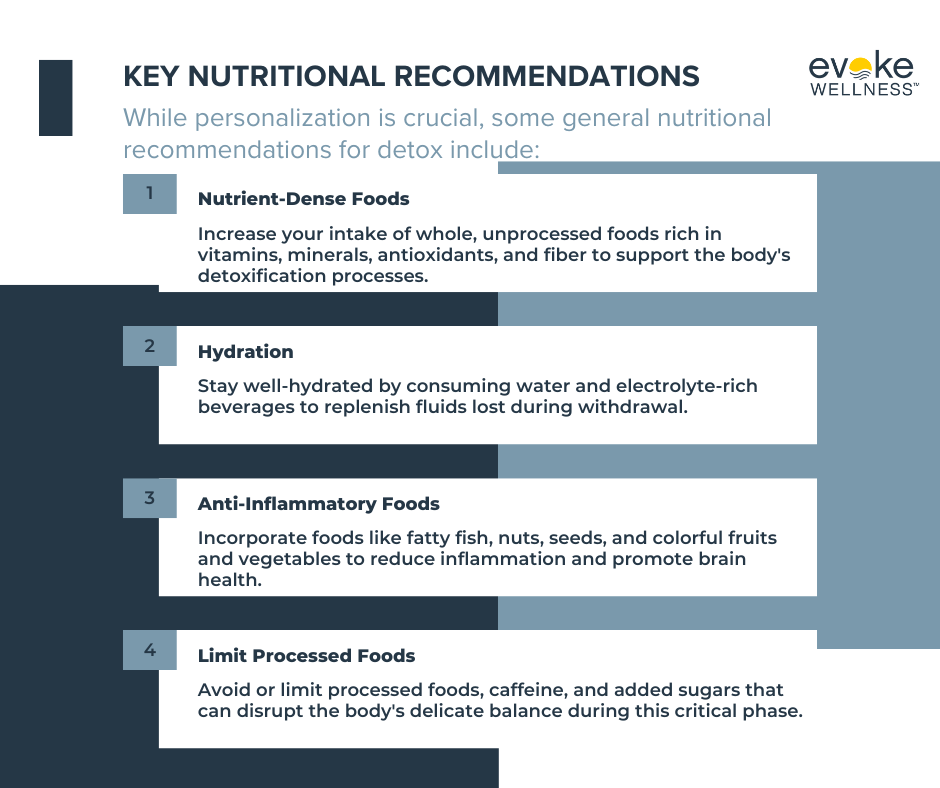As you embark on your journey to recovery, understanding the pivotal role of nutrition in detoxification is crucial. At Evoke Wellness at Hilliard, we recognize that proper nourishment is a cornerstone of effective addiction treatment. Recent studies show that up to 50% of individuals with substance use disorders are malnourished, impacting their body’s ability to heal. Our comprehensive approach, including medical detox and dual diagnosis treatment, emphasizes the importance of nutrition in supporting your body’s natural healing process. By addressing both the physical and psychological aspects of addiction, our substance abuse treatment program provides you with the tools necessary for lasting recovery. Discover how targeted nutrition can enhance your detox experience and set the foundation for a healthier future.
Together, let’s embrace the journey to recovery and the promise of a new beginning. Call us at (833) 949-1347 today or reach out online.
Why Nutrition is Important During Detox
Proper nutrition plays a crucial role in supporting your body’s natural healing process during detox. As you eliminate substances from your system, your body undergoes significant physical and mental stress, making adequate nourishment vital.
Replenish Lost Nutrients
Substance abuse can deplete your body of essential vitamins, minerals, and other nutrients. During detox, a balanced diet rich in fruits, vegetables, lean proteins, and whole grains helps replenish these deficiencies, boosting your energy levels and supporting overall recovery.
Manage Withdrawal Symptoms
Withdrawal symptoms like nausea, fatigue, and mood swings can be exacerbated by poor nutrition. A diet tailored to your specific needs can help alleviate these symptoms, promoting a more comfortable and successful detox experience.
Support Mental Health
Professional medical detox often includes counseling and therapy to address the psychological aspects of addiction. Proper nutrition aids in maintaining mental clarity, focus, and emotional stability, enhancing the effectiveness of these interventions.
Prepare for Ongoing Recovery
Detox is just the first step in the recovery journey. Adequate nutrition during this phase prepares your body and mind for the subsequent stages of comprehensive addiction treatment, ensuring you have the strength and resilience to fully engage in the rehabilitation process.
By prioritizing proper nutrition during detox, you give your body the best chance to heal, recover, and prepare for a successful, long-term recovery. Consult with healthcare professionals to develop a personalized nutritional plan tailored to your specific needs and goals.
How Substance Abuse Affects Your Body and Nutrient Levels
Depleted Nutrient Reserves
Prolonged substance abuse, whether alcohol or drugs, can severely deplete your body’s nutrient reserves. According to research, poor dietary intake, malabsorption issues, and increased metabolic demands all contribute to widespread nutritional deficiencies. Essential vitamins, minerals, and other micronutrients become alarmingly low, hindering every bodily function.
Organ Damage and Impaired Absorption
Alcohol abuse in particular takes a heavy toll on vital organs like the liver, heart, and gastrointestinal system. Liver disease, pancreatitis, and ulcers can impair nutrient absorption and utilization. This compounds the problem, creating a vicious cycle of worsening malnutrition and organ damage.
Neurological Impairment
Your brain requires a steady supply of nutrients to function optimally. However, substance abuse disrupts this delicate balance. Alcohol is a depressant and can worsen mental health conditions like anxiety and depression. Other substances can lead to cognitive impairment, memory issues, and even conditions like Wernicke-Korsakoff syndrome.
By understanding how substance abuse ravages your body’s nutrient stores, you can appreciate the vital role proper nutrition plays in the detoxification and recovery process. Replenishing depleted nutrients supports your body’s natural healing abilities, helping you regain strength, clarity, and overall well-being.
Essential Nutrients to Support Detoxification
Protein for Repair and Recovery
Adequate protein intake is vital during detox to support tissue repair, immune function, and overall recovery. Lean protein sources like poultry, fish, eggs, and plant-based options such as legumes and nuts provide the necessary amino acids to rebuild cells and restore energy levels depleted by substance abuse. According to Stanford Medicine, protein deficiency can impair the body’s ability to detoxify and eliminate harmful substances.
Antioxidants to Combat Oxidative Stress
Heavy alcohol or drug use generates excessive free radicals, leading to oxidative stress that damages cells and organs. Antioxidant-rich foods like berries, leafy greens, nuts, and seeds can neutralize these harmful molecules and mitigate inflammation. A study published in Biomolecules highlights the importance of antioxidants in supporting liver function during the detoxification process.
B Vitamins for Energy and Brain Health
Substance abuse often results in vitamin B deficiencies, impacting energy levels, cognitive function, and mood regulation. Replenishing B vitamins like thiamine, niacin, and folate through whole grains, legumes, nuts, seeds, and fortified foods can aid in restoring mental clarity and alleviating fatigue during recovery. According to the National Institute on Drug Abuse, proper nutrition is essential for successful addiction treatment outcomes.
Hydration for Detoxification Support
Staying well-hydrated is crucial during detox, as adequate fluid intake supports the kidneys and liver in flushing out toxins from the body. A study published in the Journal of Biological Chemistry found that dehydration can impair the body’s ability to metabolize and eliminate waste products effectively. Aim for at least 8 glasses of water daily, and consider adding electrolyte-rich beverages like coconut water to replenish essential minerals lost during withdrawal.
By prioritizing nutrient-dense whole foods and proper hydration, individuals undergoing detoxification can support their body’s natural healing processes, alleviate withdrawal symptoms, and lay a strong foundation for sustained recovery.
Foods to Avoid During Detox
When going through the detox process, your body is working hard to eliminate toxins and restore balance. Certain foods and beverages can hinder this natural cleansing and even trigger cravings or withdrawal symptoms. According to addiction experts, maintaining a nutritious diet is crucial for supporting your body’s healing and recovery.
Processed & Sugary Foods
- Processed foods are often high in salt, sugar, and unhealthy fats, which can tax your body’s detoxification systems.
- Sugary snacks and drinks can cause blood sugar spikes and crashes, leading to fatigue, mood swings, and intense cravings.
- Studies show that these foods contribute to the “pink cloud” effect, an initial euphoric state in early recovery that can give way to emotional turmoil.
Caffeinated Beverages
- Caffeinated drinks like coffee, energy drinks, and certain teas can disrupt sleep patterns and exacerbate anxiety and irritability during detox.
- Caffeine is a stimulant that can mimic the effects of certain drugs, potentially triggering cravings or relapse. As noted by relapse prevention experts, avoiding triggers is crucial.
Alcohol & Fermented Foods
- Alcohol should be strictly avoided during detox, as it can counteract the healing process and increase the risk of relapse.
- Fermented foods like vinegar, soy sauce, and certain condiments may contain trace amounts of alcohol that could potentially derail your progress.
By steering clear of these problematic foods and beverages, you can support your body’s natural detoxification process and increase your chances of a successful recovery. Professional addiction therapy programs can provide guidance on maintaining a nutritious, detox-friendly diet tailored to your individual needs.
Creating a Personalized Nutrition Plan for Detox
Nutritional Support During Recovery
During detox and addiction recovery, proper nutrition plays a vital role in restoring balance and supporting the body’s natural healing processes. Substance abuse can deplete essential nutrients, leaving the body in a compromised state. A personalized nutrition plan can replenish these deficiencies and provide the fuel needed for physical and mental rejuvenation.
Tailored to Individual Needs
A one-size-fits-all approach is rarely effective when it comes to nutrition during detox. A personalized plan tailored to your specific needs, substance history, and any co-occurring medical conditions can significantly enhance the recovery journey. Factors like food preferences, allergies, and dietary restrictions should also be considered for optimal adherence and sustainability.
Expert Guidance
Working with a qualified nutritionist or registered dietitian can ensure your personalized nutrition plan is comprehensive and effective. These professionals can provide guidance on meal planning, supplement recommendations, and strategies to manage cravings or dietary challenges that may arise during detox and recovery.
Why Nutrition Matters in Detox: FAQs
Detox and Nutrient Depletion
The detoxification process can be extremely taxing on the body, leading to nutrient depletion. According to research, substance abuse and withdrawal deplete essential vitamins, minerals, and antioxidants that support organ function and immune health. Replenishing these nutrients through a balanced diet becomes crucial for the body’s natural healing process.
Role of Hydration
Staying hydrated is vital during detox. Drinking plenty of water and electrolyte-rich fluids can help flush out toxins, alleviate withdrawal symptoms like headaches and fatigue, and support overall bodily functions.
Importance of Protein
Adequate protein intake is essential for tissue repair and rebuilding during detox. Consuming protein-rich foods can help the body recover from the physical stresses of substance abuse and withdrawal, promoting a stronger recovery.
Avoiding Processed Foods
Processed, high-sugar, and high-fat foods can further burden the body during detox, potentially exacerbating withdrawal symptoms and slowing the healing process. Focusing on nutrient-dense, whole foods can support the body’s natural detoxification mechanisms.
Long-Term Recovery Support
Proper nutrition during detox can lay the foundation for long-term recovery by restoring balance, reducing cravings, and improving overall physical and mental well-being. Working with healthcare professionals or nutritionists can help develop a personalized plan for optimal nutritional support.
Conclusion
As you embark on your journey to recovery, remember that proper nutrition is a crucial component of the detox process. By fueling your body with the right nutrients, you support its natural healing mechanisms and set the stage for long-term success. Recent studies show that a balanced diet can reduce cravings by up to 50% during detox. Whether you’re seeking addiction treatment, a comprehensive substance abuse treatment program, or dual diagnosis treatment, prioritizing nutrition alongside medical detox can significantly improve outcomes. At Evoke Wellness at Hilliard, we understand the intricate connection between nutrition and recovery. Our expert team is committed to guiding you through every step of your healing journey, ensuring that your body receives the nourishment it needs to thrive in sobriety.
Begin Your Journey with Evoke Wellness at Hilliard
If you or a loved one is considering treatment, Evoke Wellness at Hilliard invites you to contact us. Our compassionate team is ready to answer your questions, discuss your needs, and help you take the first steps toward recovery. In Hilliard, you’ll find more than just a treatment program – you’ll discover a community dedicated to your wellness and success. Together, let’s embrace the journey to recovery and the promise of a new beginning. Call us at (833) 949-1347 today or reach out online.



